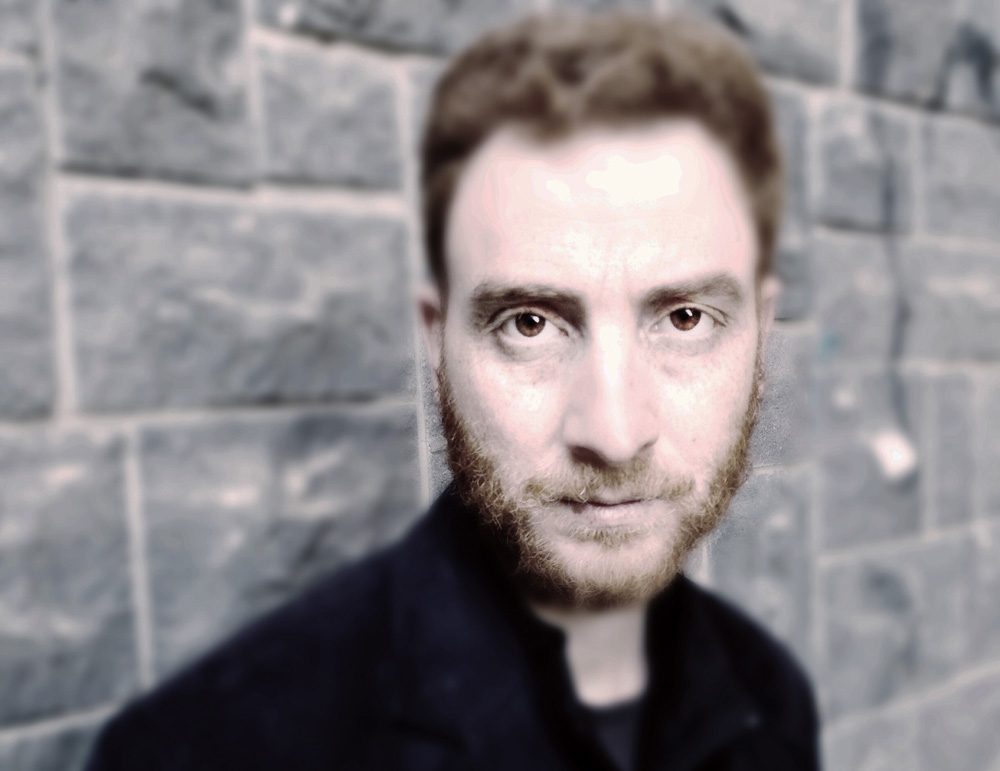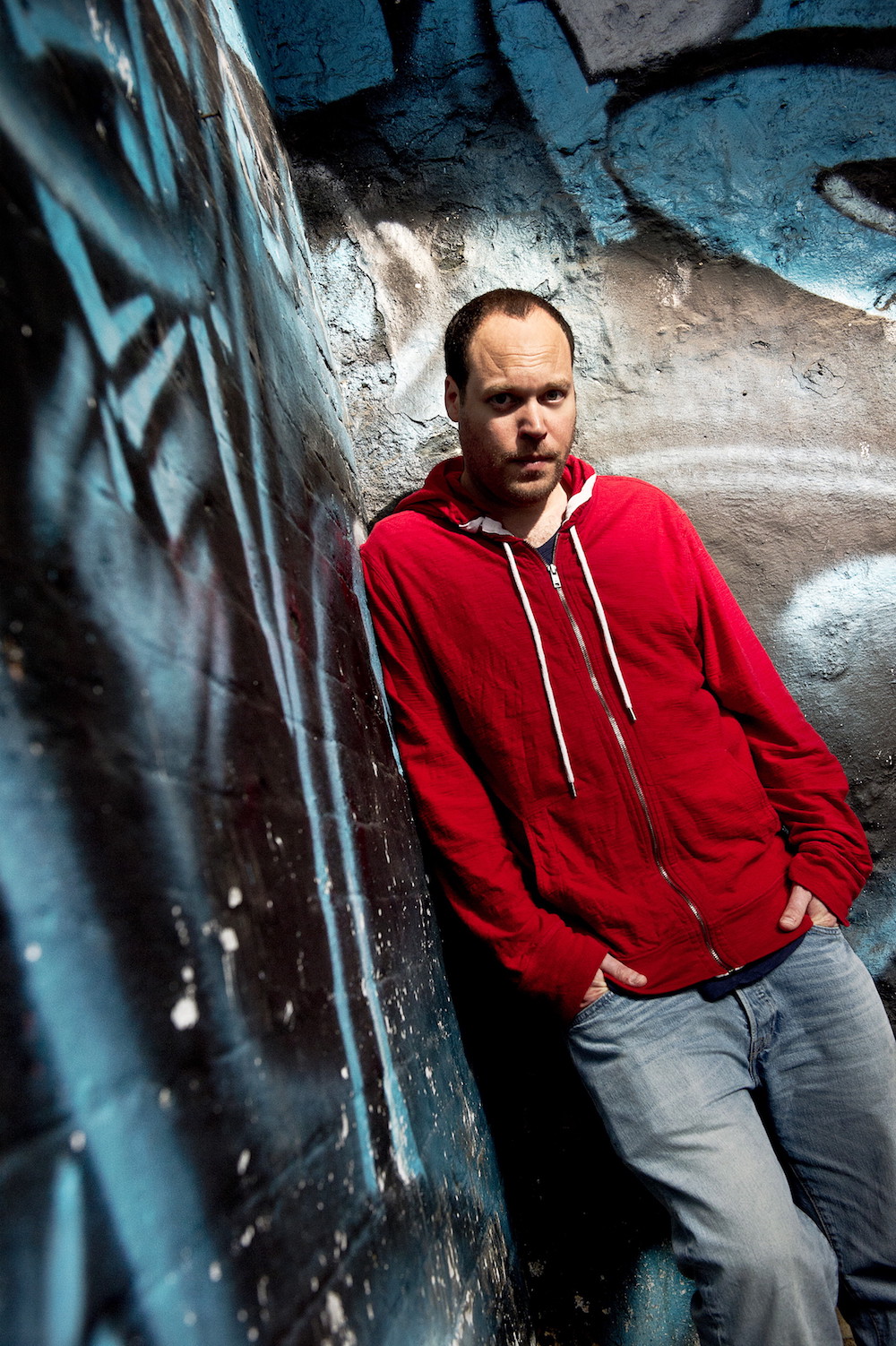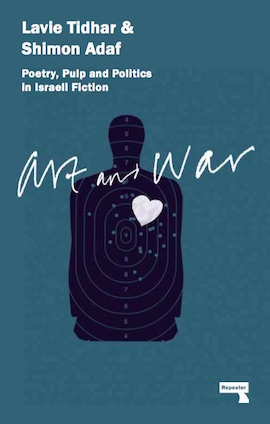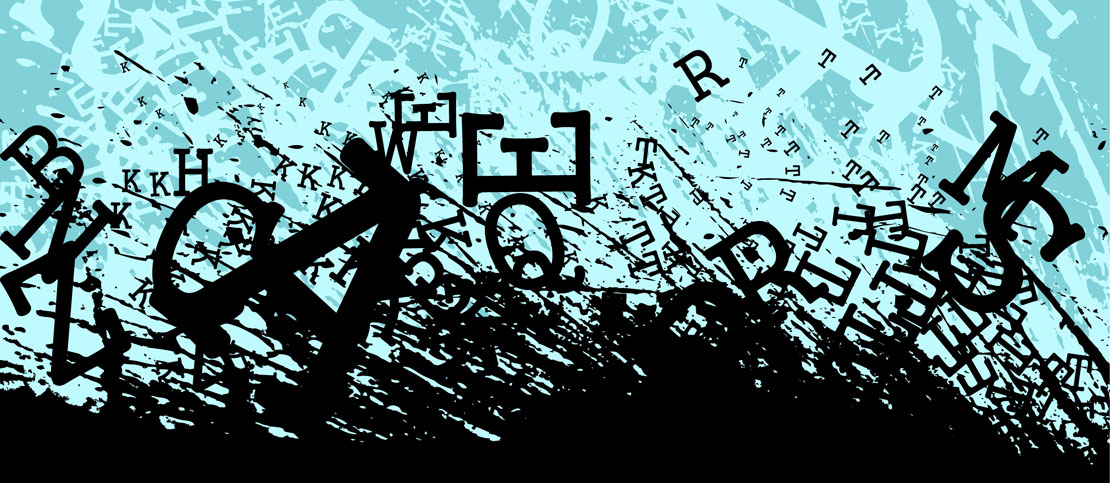“Art and War: Poetry, Pulp and Politics in Israeli Fiction”, by Lavie Tidhar and Shimon Adaf; Repeater, 300 pages, $14.95
Have you ever eavesdropped on the conversations of the brilliant people at the table next to you, and wanted to jump in and interrupt, to ask your own questions? Art and War: Poetry, Pulp and Politics in Israeli Fiction, a new book of conversations between two writers, is sure to make readers feel that way.
Art and War consists of conversations between Sapir Prize winning Tel Aviv resident Shimon Adaf and World Fantasy Award winning London resident Lavie Tidhar about the many things that enlighten, bother, and frighten them. They talk here about their worries about the book’s coming out, the realities of Israel today, the Holocaust, science fiction, digression, and how to answer for fictional characters – or each other. Being writers, they’ve each written a story at the conclusion of the dialogue in which the other is a character. Art and War comes from that impulse good friends have to push their friend and force them to actually make sense and clarify statements. Or, in the words of the authors via email, it is, “very much a conversation, not an agreement. Think of two cranky old rabbis having an argument about the right way to boil an egg and that, I suspect, would be closer to it!” says Lavie Tidhar. Shimon Adaf characterizes their interchanges as like “two Halacha students shouting over the status of an egg that has been laid during a holiday…”
The two generated this dialogue, and the accompanying stories, in the aftermath of both being too depressed about the events of the summer of 2014 and the war in Gaza to have much discussion on anything. Yet, ultimately, the sense of needing to respond to the world in which they found themselves got them to speak to each other about things that concerned them. Tidhar responded to this reporter’s query about what is “Jewish conversation” that he is “less a part of the conversation than the guy standing by the drinks cabinet at the party making rude comments about everyone else’s dancing.” His friend Adaf added to his comment, “But that guy has an immense role in the conversation. He drives it along. True conversation is not about agreements, but about speaking to each other while being open to the interruptions, misunderstandings and digressions suggested by the environment. A conversation in empty space is boring and stagnant. Both of us, I think, are providers of misunderstandings – Lavie by being a manufacturer of cunning interruptions, and I, by being a student of digressions.” It is precisely this lack of stagnation and the energy of the arguments between the two that drives the conversation in this text.

In Art and War, Adaf writes, “being a Jew is participating in the Jewish conversation that started when reality came into being and will end when reality is redeemed. Everything else is a distraction, an obstacle.” So for each of them, then participation in the Jewish conversation, means something different.
Adaf grew up in a large religious family and his father had plans for him: to be a rabbi. Though Adaf loves Jewish learning, following the path another laid out for him was never his desire. He became a poet, musician, and writer and now chairs the department of creative writing at Ben-Gurion University, Israel’s largest and most prestigious writing program. At 43, he is the author of eight novels and three books of poetry. In addition, Adaf frequently writes lyrics for musicians; an entire album of different musicians setting his poetry to music appeared last year and his work is read on screen in a documentary about the music scene in Sderot, “Rock in the Red Zone.”
Tidhar, 39, grew up on a kibbutz in the north of Israel and partly in South Africa, the son of a family of Holocaust survivors from one side and grandparents who came to Israel as Zionists in the 1920s and were founding members of the kibbutz on the other. Tidhar is the author of numerous books and graphic novels; his A Man Lies Dreaming was be published in March, 2016 in the U.S., and Central Station is out in May, 2016. Tidhar says of his identity in a recent interview that, “well, at the moment I’m back living in London. I suppose my main identity is still as an Israeli – Hebrew is my first language and it’s still an important part of me.”

Though their backgrounds are far apart, as Adaf is from a Moroccan family in Sderot in the South and Tidhar from an Ashkenazi family in the north of the country, they share a love of particular books read in childhood, of science fiction and writing. Tidhar left Israel before his army service to backpack around the world, including to the village his family was from in Transylvania, the only person in his family to make the trip. Tidhar writes in Art and War of that, “I went back to the cemetery where my great great grandfather lives. His name was Adolf Heizikovics. How is that for irony? Hitler even managed to ruin the name.” Adaf by contrast feels that it was not Hitler but Zionists who removed his family’s pride in their heritage as Mizrahim and as religious Jews. Adaf writes, “I write for readers who defy ready-made categories of identity and experience and their ready-made modes of representation. Yet, I’m vigilant in giving form to my past, to my parents’ silenced heritage, even to the unkind memories of studying with my father, of the gnashing of teeth.”
Tidhar says in an email that they share both having a “childhood spent in libraries of one sort or another.” He added that, “we know each other by the books we read as kids.” Adaf says of his childhood reading, “So I escaped, in the only way I know how, through other texts. I immersed myself in children’s books that told about fantastical escapes from mundane life – children going on adventures, child detectives nosing around, children entering wonderlands through unexpected doors. And later on, science fiction, oh, stories and novels that told about travel in the expanses of space, meeting aliens, transfigurations, metamorphoses of the consciousness, becoming alien yourself, to everything you knew, being reborn.”
 Art and War came about after Tidhar convinced his London publishers PS Publishing to bring out Adaf’s third novel, Sunburnt Faces, in English. Tidhar explained the genesis of Art and War in an email:
Art and War came about after Tidhar convinced his London publishers PS Publishing to bring out Adaf’s third novel, Sunburnt Faces, in English. Tidhar explained the genesis of Art and War in an email:
“It started off, as you mention, as a simple interview. Sunburnt Faces was coming out in English and I thought I’d interview Shimon about it, but Shimon insisted on answering every question with a question of his own, and before we knew it – and despite my protestations! – it became a long conversation instead.”
Adaf wrote, “Whenever I started answering a question as to my reasons for writing or as to a certain choice of materials and forms, my interest turned from my own work to Lavie’s and the techniques he employs in it. In Art and War we decided to roll with it, to give the book the loose structure of a conversation in correspondence. It is a form that has been common among writers all along. Here are two thought provoking questions: what is a friendship between writers?” Adaf concluded by wondering whether such a thing as a friendship ”can be formulated into a new form of writing?”
This reporter queried both of them via email. All quotes are from Art and War.
BK: Lavie writes, “I see literature as an act of unbalancing, as a challenge. It needs to upset people, it needs to push. It needs, I think, to be uncomfortable. It shouldn’t please.” How is this done? Are there limits?
Shimon: I think it is more a regulative idea than a concrete goal. It means that writers should start by working out the conventions and systems of values of their time (and of the literature written in order to ascertain them) and find a way to expose them or oppose them. It means that writing, basically, should be a critical act. And as for limits, is it a question about the limits of oppositions and provocation or about the writers’ limits of thinking outside of the paradigms of their time? If it’s the first, it is up to each writer to decide for themselves. If it’s the second, then of course there are limits. It’s hard to admit, but writers are human too.
Lavie: Graham Greene made a distinction between his ‘novels’ and his ‘entertainments,’ but later on his life had to admit it was a pointless distinction. I think the position I come from is you try to write the entertainment, and kind of hide the rest inside it. I think it’s why I’ve been attracted early on to science fiction – it can be a very subversive literature that masquerades as cheap entertainment. You can see it used that way in repressive regimes – the Soviet Union is often given as an example.
BK: Lavie writes, “I don’t have answers, but it worries me when it becomes so that there are questions you can’t even ask. That you’re afraid – like I was in that interview – to say what you really think because the threat of violence is very real.” I wonder whether living as a Jew, even an Israeli Jew, in the Diaspora there are things you fear and violence you fear in a different way than in Israel? But it seems odd and wrong to say to someone who grew up in Sderot, the most fired upon city in Israel (correct I think?) that there is less violence against Jews in Israel than in Diaspora. I am interested in both of your takes on this.
Shimon: Yes, there is irony here. During the 2014 war in Gaza, waves of immigrants from France flooded Israel. One couldn’t help but laugh at first: really, the safe haven you seek is bombarded Israel? But it is a bitter irony. What enables this cognitive dissonance is a conceptual shift in the perception of the self – from persecuted people to lawful citizens defending themselves. This very shift also enables them to discard any iota of compassion they should have toward other populations under oppression. We live in a time in which the desire for violence comes first. We look for justifications afterwards. Jews aren’t an exception to this.
Lavie: Though you could argue that’s always been the case…
BK: Lavie writes, “And it’s a danger for writers, because you have to speak for yourself, not for others. And it’s easy to be seduced. To accept an award, to become a spokesperson, and eventually you become a part of the group, a part of this story that we want to present to the world. I remember you saying once about the Israeli writers who became successful overseas, in translation – our great Spokesmen, for they are always men of a certain kind – how their writing became writing for translation. There is that insidious form of government sponsored propaganda in Israel, the Hasbara, the great project of explaining, a campaign to justify and promote Israel and what it does to the foreign media, and it’s almost a responsibility to do so – and yet you wonder why it’s needed.”
So yes, both of you, what made you write this in English? Who will your readers be? Or do you hope your readers will be?
Shimon: Since childhood I had the fantasy of expressing myself in a language unbeknownst to my peers, be it a private language or a foreign one. In my third collection of poetry, I was stricken with such a grief I felt that my command of Hebrew prevents me from fully expressing it. I had to learn my language anew. One of poems came out in broken English (in a Hebrew transcription). It opens with the lines: “Just before I fall asleep, I think / I should write in a language where / I’m deaf to the pulse of words” [Editor’s note: Poem 28 in the book Aviva-No, 2009]. So I went back to the university and studied Latin. Being brought up religious, Latin, as the Talmud teaches us, is the language of the oppressor, of the enemy of everything holy, of the evil empire, the destroyer of Judaism, at whose gate the leprous Messiah sits and waits. I’d never gain the expertise to write in Latin. But the urge to write in a language that allows me to abandon the accumulated knowledge of my own language is still strong.
Lavie: I never actually expect to have any readers! Also, I never expect to learn Latin, which I’ll probably regret if I ever end up in the middle of the Roman Empire during a time travel accident. So let’s hope that doesn’t happen.

BK: With the current climate in Israel today – Dorit Rabinyan’s book Borderlife being excluded from the high school curriculum, and left-wing NGOs needing to declare where they get their funds? Even more Im Tirtzu put out a list of artists who are “leftie traitors” ( I haven’t checked but am guessing Shimon would be a candidate for the list). How is it possible to deal with reality in Israel where dissent is being stifled more and more? To publish this in Hebrew?
Lavie: Well, there’s a good reason this is being published in English, overseas… and in fact, none of my books are published in Israel, a state of irony I find it hard to be indifferent to. I think it’s interesting my books can be published in Japan, or Italy, but not in my home country. Especially when the subjects I deal with – the Holocaust, terrorism, Jewish history – would seem, on the face of it, to be core subjects of Israeli fiction. But of course my take on them, and the tools I use to address them, aren’t really a part of what Israeli fiction does. I’ve grown to accept it, I suppose. At the end of the day I have a career many would be envious of, it seems silly to be upset because I can’t be published in this one small country… [Editor’s note – he will now be published by Keter so this has changed.]
Shimon: I was really bummed out I didn’t appear on the “home grown traitors” list. It would have been an honor. The more the political reality is revealed as fascist in nature, the more it is the task of literature to pose and explore alternatives. The question of publication for me is always secondary. It is the question of sanity that drives it all. After all, as the struggle becomes clearer outside of me, the inner one, for autonomy, grows fiercer.
BK: Shimon has the last word in Art and War. “You have the answers you need. Writing – be it writing speculative fiction or detective fiction or poetry or your unique mesh of them – enables you to stay in contact with the initial awe and bewilderment we slowly forget as we go along… I won’t improve in the art of becoming myself unless I re-imagine this self into more vibrant forms of existence, full of radiance.” Do you feel differently now that you’ve written it all out?
Lavie: It may sound odd, but I feel very uncomfortable with the book coming out. It does seem to me terribly self-indulgent to do a book like this, and I usually much prefer to keep my thoughts, my voice, to fiction. It does feel like an odd public performance – but I think, like with the fiction, there was the sense that these were subjects worth talking about, and worth discussing – as personal or uncomfortable as they may be.
Shimon: I tend to oscillate in my recent novels between fiction, poetry and essays, to try and bring together the many voices of writing. Naturally I wish to challenge the definitions of the biographical-confessional and the fictitious (because, what’s more true to my experience, that I have worked as a teenager in a factory or that I’m haunted by ghosts?). So, on my part, the writing of this book is an expansion of what I consider to be my “literary endeavour.”
BK: Lavie opens with the stories of writers who have a great deal of early promise and then don’t do what they might have been able to do with it and his wanting to live as though if he were hit by a bus he would die knowing that he had done all he could to be his best. In Shimon’s story he has this line: “Once more, I felt a pang of sorrow for choosing not to have children.” I find it interesting that you address the question of legacy so differently. What do you each want your legacy to be?
Lavie: I suspect my legacy might be being a footnote in Shimon’s eventual biography… I’m joking (I think). I don’t really think it’s something to worry about that much – it’s more about doing something worthwhile while you’re still around. Which in a way is very much like Judaism – it’s not a question of will you go to heaven, it’s a question of, will you be good here on Earth?
Shimon: It seems weird to have to answer for the sentiment of a fictional character. But I’ll try all the same: Isn’t it somewhat possessive to consider children as legacy? I never think of my work in future terms. Sub specie aeternitatis, as philosophers would say, everything is dismissible. On this scale, the glory of the footnote is alluring, the call of nothingness crashes the spirit.
Lavie: We were going to have footnotes in the book too, but then we didn’t. I keep trying to write books with footnotes in them and they keep getting taken out. More seriously, I suspect I might just be a character in one of Shimon’s books, so I hope he is accountable for my actions.
Beth Kissileff is the editor of the anthology Reading Genesis and author of the novel Questioning Return. Illustrative photos by Shutterstock.com

